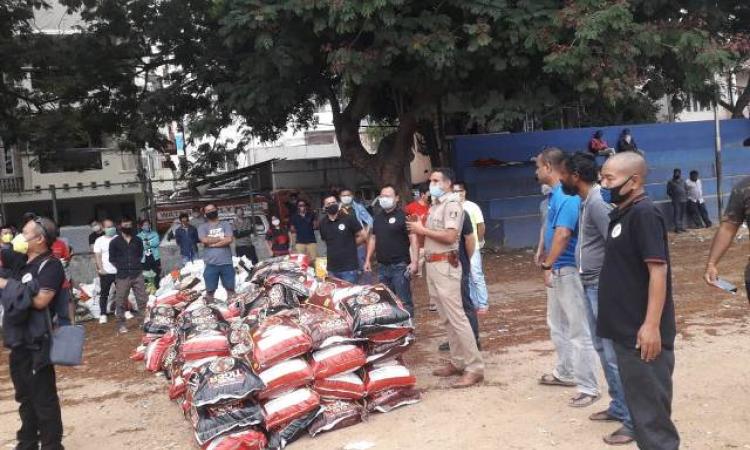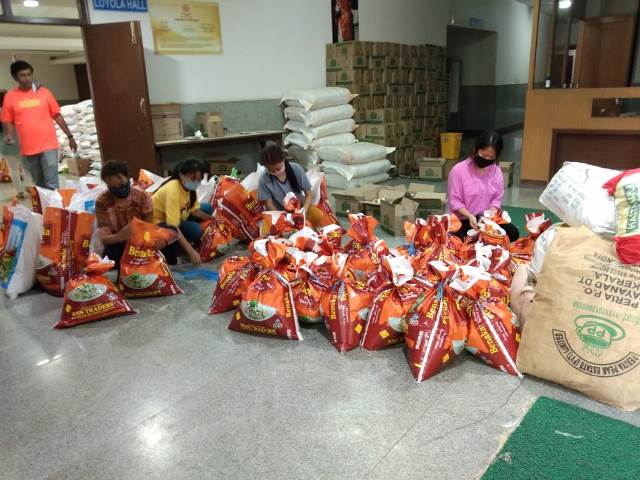
While Covid-19 has left many countries including India in the line of fire, the situation in India is now getting particularly alarming with the number of people infected by Covid-19 rising at a rapid pace. While cases continue to rise in some of the major Indian cities, the situation in Northeast appears to be relatively better as compared to other states although cases appear to be rising.
This is because the influx of national and international tourists has been limited, with only Guwahati having an international airport. Also the movement between villages and towns has been banned leading to very little internal movement and migration. Northeast also has a lower population density, the lifestyles of people are minimalistic preventing them from travelling over long distances. The state has also adhered to very strict implementation of social distancing, cancellation of religious functions, strict quarantining of new arrivals while strong village structures, community bonds and traditions have ensured a relatively disciplined response and obedience to stipulated norms. Farming and kitchen gardens have helped the families survive in times when no ration could reach them.
The plight of North East migrants
However, the worst affected appear to be many migrants from the Northeast who work in other parts of the country. At Bengaluru, for example, there is a population of about 3.5 lakh Northeast migrants with at least 10 percent i.e. about 35,000 being critically affected and unable to pay for either rent or food. People working in saloons and small enterprises have been badly affected as they have received half of their salary for March, but no salaries after that. Most have been sending home whatever savings they have and are unable to pay either for rent or for food. Students asked to vacate hostels have not been able to get back and cannot afford rental accommodation including deposits and are now living in subpar arrangements in cheap accommodations.
Not all migrants have cooking arrangements as many are dependent on their place of work or nearby eateries leading to problems in accessing and cooking food during the lockdown. Many of them have been unable to access government relief schemes which are largely intimated online and require online form filling. The poorest who do not have bank accounts, are totally cut off from any relief. Large groups of daily wagers (especially from Assam and Tripura) in industrial areas are without funds and in deep distress. There have also been many instances of racial discrimination against them. Despite best intentions, there is much duplication and confusion between government and various NGOs in providing help.
The condition of people back home
The families of the migrants back home have been badly affected as migrants have been unable to send money thus affecting their day to day lives. People within the state who have migrated to cities or urban areas for jobs and livelihoods have been badly impacted due to closure of businesses. In Nagaland, livelihoods for small scale vegetable farmers who depend on vegetable packaged seeds like carrot and cabbage from the mainland have been affected because of lack of access to shops at the time of sowing. Many farmers have been unable to access fertilisers affecting their agricultural practices and outputs. In Assam, daily wage earners (especially in construction) have been affected because the contractors have stopped assigning work due to transport problem. In South Manipur (Singhat) business of selling wood and charcoal has stopped due to transport issues, which in turn has affected the daily wage workers. For small shopkeepers, materials are not available for sale due to the ban on transport. Small hotels/ tea-shop owners have been affected because they have been unable to open their shops.
People working in the cities and towns have lost their jobs as domestic-helpers and workers in small hotels and bakeries. Most are back in their villages without any income. Bus services between towns and villages has stopped. This has affected the owners, drivers, helpers and material suppliers. Farmers in some places are impacted by not being able to get their produce to the markets. As most villages have no banks or ATMs, a major challenge faced by the people is not having liquid cash as they cannot visit the towns. Most people are not familiar with net banking facilities and hence lack of liquid cash has created problems for the people. At places where people are badly affected, the risk of crimes due to theft, selling of illegal goods & narcotics, smuggling and so on has been on a rise as people are struggling to make a living. Students have lost valuable school time.
However, agricultural communities have been better off in terms of their work. For example, in Mizoram, Manipur and Nagaland, the months of March, April, May, and June involves a lot of work in the “jhum” field and terrace fields because of which the villagers with land do not indulge in any daily wage work in these months. So the lockdown hasn't affected such communities too badly on the work front. At places where villagers produce their own rice, they do not have to depend on shops to buy rice or dal. They live off vegetables from their farm or from forest produce.
The variety of food consumption has changed, due to lack of certain types of vegetables, but no one in these village is sleeping on an empty stomach due to the lockdown. At many places where organic farming is the norm, there is no effect on farming as the farmers do not require either pesticides or fertilisers. Most village communities are self sufficient for labour and often pool labour from within the village. They are not dependent on migrant labour. However, where labour is required from neighbouring villages, there could be a problem. At the same time, the government is trying to ensure that foodgrains are reaching everywhere.
Sunbird trust to the rescue
By virtue of recognition in the Northeast, Sunbird trust was approached for assistance by several Northeast organisations at Bengaluru where we are registered and have an office. Through generous contributions of our donors, our team members and volunteers of the partner organisations have distributed dry rations for 2 – 3 weeks for over 12,000 people at Bengaluru from 3rd April onwards. We have now become a nodal organisation at Bengaluru for helping the Northeast people. The relief efforts have stretched well beyond the city limits to reach large number of migrant labourers in the industrial areas around the city.
Sunbird has been working essentially at Bengaluru and has engaged with almost the entire Northeast population of the city by partnering with nearly 40 organisations representing various tribes and communities. Sunbird tries to resolve issues brought up through our partner organisations by interacting with the police and civil administration. Sunbird Trust is also a part of the Government coordinating groups for the Covid crisis and has ensured efficient “last mile” distribution thanks to our partners and volunteers. These entities are well organised with detailed lists and contact details of their members. They take the rations and distribute it to their affected members through a team of over 100 volunteers. For example, young professionals from Assam Society of Bangalore (ASB) go out every weekend in their personal vehicles taking rations to the neediest. For this, they make individual contributions which is however not sufficient to reach hundreds of Assamese migrants. So Sunbird Trust works to complement their work by contributing tailormade ration kits.

Students and professionals from Manipuri Diaspora also carry out large ration distribution drives. This organisation effectively covers almost the entire Manipur migrant population. They do surveys, then arrange for ration distribution area wise on a large scale with prior intimation to the police and civil administration. Sunbird Trust team members accompany them.
As the Northeast states has been largely spared by the virus till recently, sunbird teams posted at schools in remote villages used this time to engage with the village folks and strengthen our understanding of their issues. However at two locations (Singhat and Tamei) where we have schools, we have reached out to 250 families in indigent poverty by supplying rations (In Tamei with the help of the Army to reach these villages)
Easing the impacts of the pandemic
All across the country, the NGOs seem to have risen to the occasion to support government initiatives in time of crisis. Most NGOs are deeply connected to their constituencies and are aware of nuances the government rarely understands. Importantly, they provide a deeper “connect” and efficient last mile delivery to the doorsteps of the affected. The government could do more to leverage the strengths of the NGOs by empowering them and connecting better with them through a slew of measures.
Government could liberalise FCRA regulations to leverage NRI and OCI funding at such times or even accord temporary permission with strict guidelines for expenditure. Given some confusion and duplication of relief efforts by NGOs, better coordination and leadership required. Information must be available about where help is required and where it is not.
Since the risk of the rise in cases in the state persists, it is practical that some of the restrictions can be maintained while allowing normal life to continue like:
a. Alternate market days with appropriate social distancing
b. Allowing transportation to reach the markets
c. Allowing small enterprises to open with appropriate restrictions
d. Supporting farmers through incentives and subsidies
e. Giving tentative dates for opening up of business
f. Focusing on economic solutions and ensuring equity by controlling inflation and putting a cap on food prices and transportation fare etc
g. Farmers are suffering due to lack of seeds. This can be eased by going “seed sovereign”, in other words, creating local community seed banks for all crops.
Northeast has managed the Covid-19 pandemic till now through timely sealing of borders by mid-March, leveraging of strong community structures at village level and religious institutions to ensure strict compliance, strict implementation of social distancing even up to village level and minimalistic lifestyle in terms of demand for daily items and forest economy. However, the risk of increase in Covid-19 cases in the states is rising and it is essential to prioritise actions to be taken in the short term and long term to prevent the virus from spreading while at the same time taking care of the basic needs of the people and sustaining the economy.
The table below highlights the short term and long term priorities for the region to deal with the pandemic.
/articles/northeast-fights-covid-19